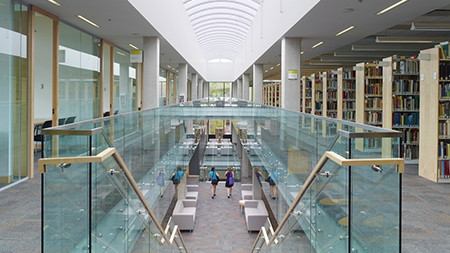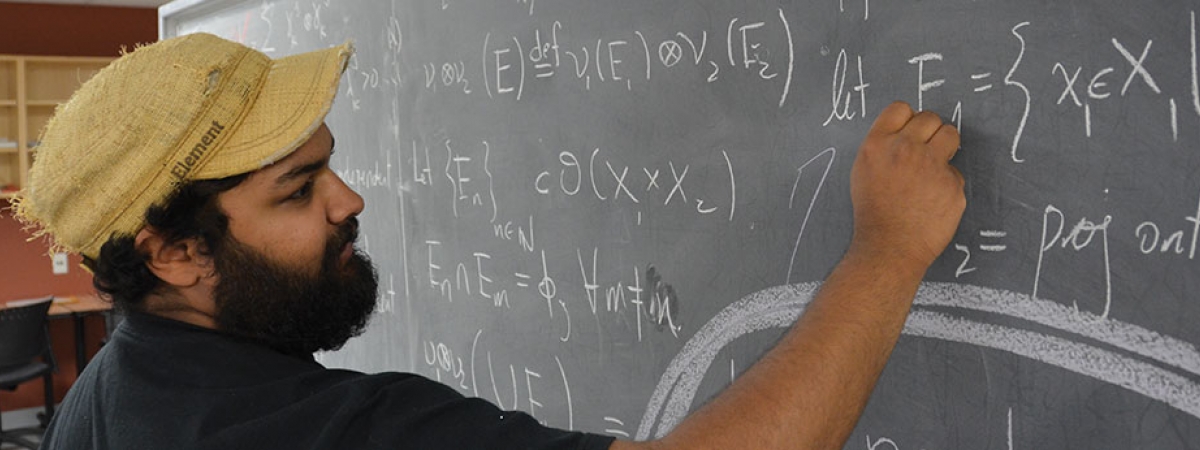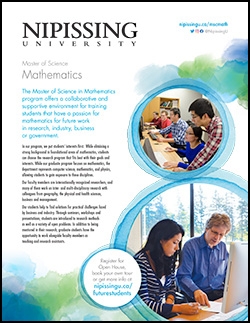Master of Science in Mathematics in our School of Graduate Studies
The Master of Science in Mathematics program consists of course work plus a Major Research Paper (MRP) or Thesis. The MRP route is a one-year (3 term) full-time program. The Thesis route is available as a two-year (6 term) full-time program, or a four-year (12 term) flex-time program. Our program trains students for future work in research, industry, business, or government, and provides a strong background in foundational areas of mathematics. Our faculty members are experts in topology, analysis, combinatorics and graph theory, industrial and applied mathematics, with research in scheduling, computational problems, numerical mathematics, and optimization. Many faculty work on inter- and multi-disciplinary research in geography, the physical and health sciences, business, and management, to name only a few. Graduate students therefore also have an opportunity to perform research on the interface of mathematics and other disciplines.
Program related questions can be directed to the Graduate Coordinator at GradMath@nipissingu.ca
- Program
- Admissions, Applications, and Dates
- Tuition and Funding
- Facilities
- Resources
- Contact Us
- Opportunities
Master of Science in Mathematics (MSc)
- Graduate Admission Requirements
- Program Requirements
- Graduate Studies Program and Degree Requirements
- Available Mathematics (MATH) Courses
- Complete listing of all courses
Thesis Route
The thesis route requires students to become more deeply proficient in an area of mathematics than is standard in an MRP. A thesis is generally (depending on the topic) longer and more detailed than an MRP. Because of its more advanced nature, a thesis requires more time to complete than an MRP. Additionally, a thesis generally (but not always) contains multi- and inter-disciplinary aspects, and will usually involve research into advanced areas of mathematics and computational science. Click here for more information about the Thesis route.
Major Research Paper Route
Through the MRP, the student must show the ability to work independently in a scholarly manner. The MRP does not have to make a significant original contribution to academic knowledge of the subject, but it must display extensive research and independent analysis. Students must demonstrate a comprehensive knowledge and understanding of the literature relating to the topic. Click here for more information about the Major Research Paper route.
Tuition and Fees
Funding and Financial Aid - Scholarships, Bursaries and Awards
Funding is available to graduate students from both internal and external sources. Internal funding includes teaching/research assistantships, faculty research grants, and Nipissing Graduate Scholarships. The value of these scholarships varies. Students are also encouraged to compete for scholarships from the Social Sciences and Humanities Research Council (SSHRC), the Natural Science and Engineering Research Council (NSERC), the Canadian Institutes of Health Research (CIHR), the Ontario Graduate Scholarships (OGS), the Canada Graduate Scholarship, and the Mackenzie King Memorial Scholarship.

To pursue graduate studies successfully, students need guidance from dedicated faculty as well as a supportive community that will help them focus on their research and navigate their way to academic success. Nipissing offers both: our professors regularly win external grants and recognition, and our campus has cultivated a reputation for being friendly and accessible.
Workshops and conferences, organized by the Department of Computer Science and Mathematics on an annual basis, feature presentations by leading researchers from Canada and abroad, and are attended by graduate students from other universities. Throughout the year, the Department runs a research seminar where talks are often given by visiting scholars. Thus our graduate students have a unique opportunity to discuss research projects with speakers and their peers, and establish valuable international contacts.
At Nipissing, our high faculty-to-student ratio means more individual attention for graduate students and their research. Students are carefully matched with professors with compatible interests, and encouraged to pursue their passions in their research. Our annual Graduate Research Conference offers students to share their research with peers, and paid positions as research and teaching assistants allow them to gain experience in the academic world.
Students and visitors alike often comment on how fortunate Nipissing students are to study surrounded by such a beautiful natural landscape. For graduate students, such an environment is not only inspiring but offers fewer distractions than you might find in a larger centre—a fact that lends itself to finding the focus you need to achieve your research goals.
Nipissing Computational Physics Laboratory (NCPL)
The general focus of the NCPL is to develop, implement and apply advanced numerical algorithms and computational methodologies for the solution of problems arising from nanophotonics for nanotechnology and nanomedicine applications. The NCPL is an advanced physics lab intended for junior and senior level students in science and engineering. We are primarily engaged with the design of algorithms for nanoscale and multiphysics problems described by 3D fully coupled partial differential equations. Our lab is equipped with high performance computational server and several workstations with multiple operating system environments, and running a number of computational and simulation programs including COMSOL Multiphysics, MATLAB, Maple, Mathematica, Numerical Recipes, the Electronic Workbench, and others. Click here for more information about the NCPL.
Graduate Student Centre - R229
Nipissing University graduate students have access to an interdisciplinary office facility designed to be a central place for graduate students to study and interact with each other. In addition, the Graduate Student Centre is equipped with a telephone, wireless and hardwired internet, and access to shared printing.
All graduate students are eligible for access to the Graduate Student Centre.
There are 30 individual study carrels along the perimeter of the room that are assigned to individual students, or two who request to share. Assignments of designated spaces will be on a first come first serve basis. Contact the Graduate Studies Office at gradstudies.office@nipissingu.ca or in A205 to request a study carrel and key. Students are required to pay a $25.00 deposit for a key in the Finance office prior to receiving their key.
Graduate Studies Resources
- Graduate Studies Regulations
- Graduate Studies Procedures
- Graduate Studies Forms
- Graduate Studies Glossary
- Graduate Student Card Application
- Centre for Literacy
Master of Science in Mathematics Resources
Major Research Paper/Thesis Resources
Post-Graduation Opportunities and Careers
Students gain both research skills and experience working on open problems in the mathematics field. The MSc prepares them for careers in industry, research and development, business, and industry. Students may also go on to pursue doctoral degrees.
NUMERIC
The Nipissing University Mathematics Education, Research, and Information Centre (NUMERIC) represents a group of educators from the Faculty of Arts and Science (Mathematics/Physics), the Faculty of Education (Mathematics), and the local community who share an interest in promoting the learning and appreciation of mathematics through a variety of sponsored events.
We are pleased to announce that Nipissing University is an Afilliate Member of The Fields Institute for Research in Mathematical Sciences. The Fields Institute, while focusing much of its attention on mathematics as a discipline, also features the Math Ed Forum which offers regular public meetings at Fields, as well as sponsoring a variety of mathematics education events and projects. Click here for more information about NUMERIC.
Topology Research Group
Topology is a study of very far reaching generalization of geometric properties of objects, invariant under special types of deformations. Topological methods are widely used in functional analysis, differential equations, algebra, and other areas of mathematic. The following topics are of particular interest for the members of the department: dimension theory (classical, cohomological, extension, and asymptotic dimensions; infinite-dimensional spaces), selections, continuum theory, dynamical systems. Click here for more information about the Topology Research Group.
Teaching Assistantships
Teaching Assistantships are intended to help properly qualified graduate students meet the cost of their university studies. Student appointments may involve part-time duties in teaching, research, or other academic activities. Click here for more information about Teaching Assistantships.













